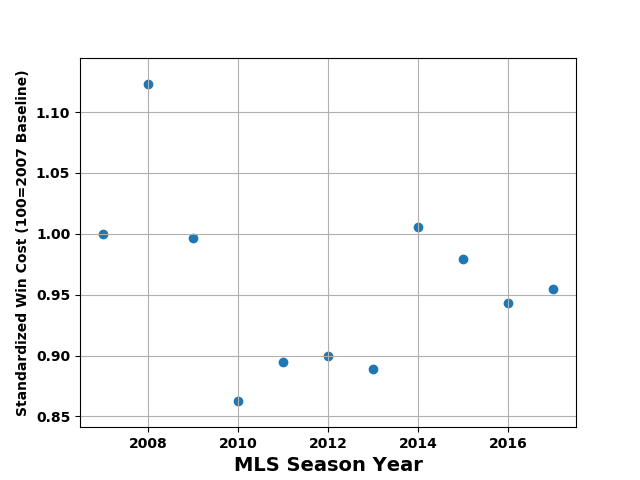MLS Front-Office Efficiency: 2017 edition
Categories: Front-Office Efficiency
The 2017 Major League Soccer regular season ended six weeks ago (and the playoffs ended this past weekend!), so it’s time for a new edition of the Front-Office Efficiency table. As was the case last year, this table is displayed as an infographic on the Soccermetrics SlideShare page and as twenty-two individual panels on the Soccermetrics Twitter page.
The efficiency metric is version 4.0 which was developed in 2015. You can read more about the process here. Only payroll amounts are factored into the financial inputs — not academy spending, which is not made public across the league, or transfer fee spending, which MLS teams have avoided until very recently. I am very aware of the issues with the salaries reported by the MLS Players Union, but in my opinion, they’re better than nothing and I want to focus more on trends.
Here are my main observations from this year’s results:
- There is a lot more movement in the Front-Office Efficiency list this season compared to previous seasons. None of the top three sides in last season’s list — FC Dallas, DC United, NY Red Bulls — are in the same places this season. Instead there are teams such as Houston Dynamo, Columbus Crew and Vancouver Whitecaps. All three teams made it to the MLS Cup Playoffs and two of them advanced to Conference final series.
- Minnesota United had the fourth-lowest adjusted payroll cost per point due to its low adjusted payroll (second-lowest in MLS) and low payroll utilization rate. Some first-time readers will be surprised to see United so high on this list, but the payroll cost metric is ultimately an amoral metric. A low cost per point could mean “cheap” just as much as it could mean “efficient.”
- There are more teams whose payroll costs per point exceed $100k. Toronto FC, LA Galaxy, NYCFC, Seattle Sounders, and Orlando City made up these teams in 2016 and were joined by the Chicago Fire, Colorado Rapids, and Portland Timbers in 2017. All of these teams made the playoffs except Orlando, LA, and Colorado. NYCFC’s payroll cost per point actually decreased by $91k, which was reflected predominately by a drop in available payroll.
- Atlanta United’s payroll cost was 13th on the list at around $87k per league point. Adjusted for inflation, this figure is about 84% of the average payroll cost in 2007. Obviously this is one data point, but given pronouncements of United’s executive leadership I wouldn’t be surprised to see the team continue to pursue a high-spend/high-performance strategy which would result in payroll costs per point closer to $100k. If Josef Martínez were available for the full season, it is very possible that the payroll cost would have indeed reached $100k.
- Toronto FC’s payroll cost per point were the highest in the league at $207k, but this actually represented an improvement in front-office efficiency as the most expensive assets were on the field more often and the team won 16 more points. In fact, Toronto’s payroll utilization rate of 71.0% was the fourth-highest in the Designated Player era. TFC’s payroll cost adjusted for inflation is twice that of the average cost in 2007, but no one will mind after a season that yielded the Canadian Championship, the MLS Supporters’ Shield, and the MLS Cup.
- Almost all of the league teams spent more to win league points this season. Only five teams saw a decrease in payroll cost per point — Columbus, Houston, Vancouver, Toronto, and NYCFC. In the league as a whole, it took on average about $104k of available payroll to win a point in 2017. This is almost three times the average payroll cost to win a league point in 2007, but about 5% lower than the 2007 payroll cost when adjusted for inflation.

The average standardized cost of MLS teams in the Designated Player era (2007 season to 2017 season). Averages are relative to 2007 cost.
The Front-Office Efficiency infographic is shown below. You can find an updated table of costs per point in real US dollars and standardized win costs in the ProjectData repository on GitHub.


